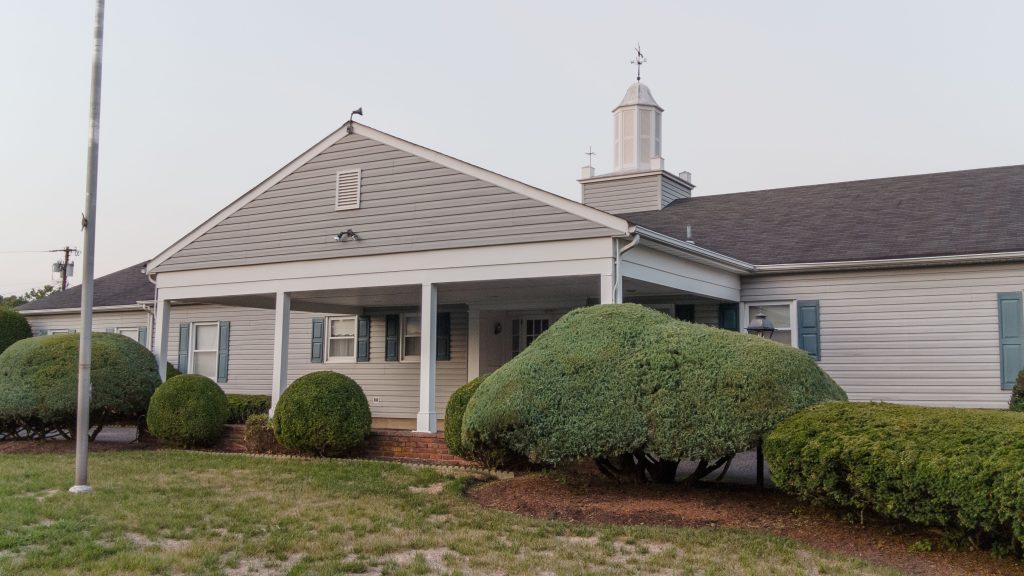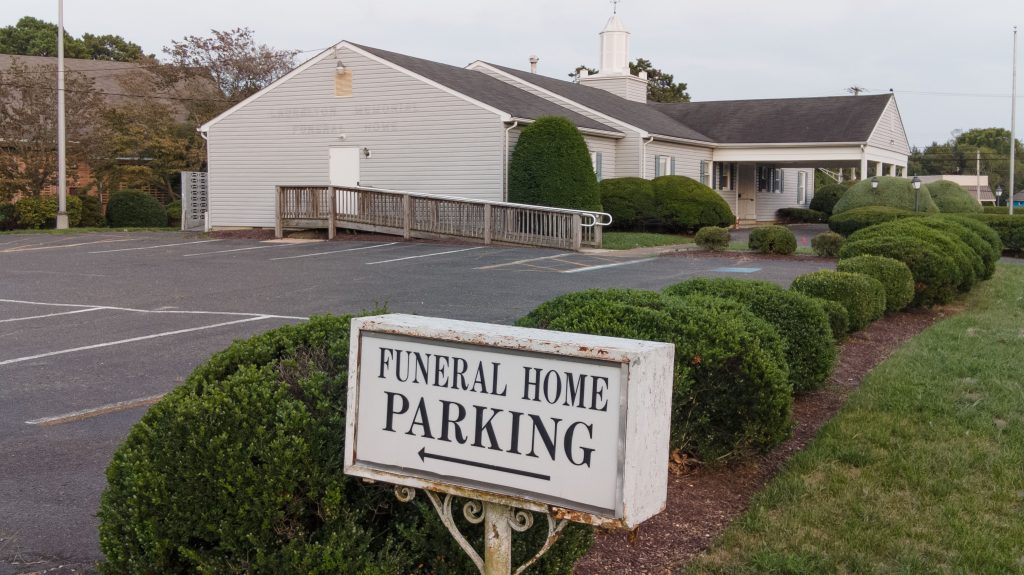After a marathon meeting of Brick Township’s zoning board that lasted nearly four hours Wednesday night, little was resolved to overcome the legal snag presented by a parking arrangement between two houses of worship that is key to allowing the second to open in the building of a former funeral home.
Temple Beth Or, formerly located on Van Zile Road, is seeking to move its now-smaller congregation to what was the Laurelton Funeral Home, located off Route 70 on Pier Avenue, abutting a residential community. While houses of worship are conditionally allowable uses in the zone of the funeral home building, an arrangement to share a parking lot with St. Thomas Lutheran Church, located across the street, has presented a legal “conundrum” for officials.

The proposed location for Temple Beth Or, in the former Laurelton Funeral Home building, Brick, N.J., Sept. 2022. (Photo: Daniel Nee)
|
|
Attendance at the board meeting Wednesday night was high, with two to three dozen residents of the surrounding neighborhood, many of whom said informally that they were in opposition to the application, present. Another two or three dozen members of the temple congregation came in support.
The funeral home site has about 15 parking spaces on its own property. Rabbi Robert Rubin, who is friends with the pastor of St. Thomas, worked out an arrangement with his colleague to use the St. Thomas parking lot for a nominal payment for 20 years. But there are questions as to the long-term viability of the lease, the availability of the parking lot, and whether the temple can count spaces on a separate property – not formally part of its zoning board application – toward its obligation under the township’s land use ordinance.
There is also a question as to how many spaces are required in the first place, with different measures – the number of seats in the proposed temple versus square footage – producing different results. The board engineer, Brian Boccanfuso, said 85 parking spaces would be required since the temple would theoretically accommodate 338 people. But a different measure would reduce that to about three dozen spaces. Another variable is the temple’s shrinking congregation, with Rubin testifying that despite having 170 members, Friday services draw about 15 worshipers and Saturday services draw between 10 and 15. A few major Holy Day services draw 50 to 60 congregants.
“We have no religious school right now,” Rubin explained, detailing a decline in membership that, sadly, has affected many houses of worship in Brick and beyond, regardless of faith or denomination. “We only have four students who are pre-high school graduation [age].”
The drop in both membership and attendance prompted Temple Beth Or to sell its large facility on Van Zile Road last year. The funeral home property, which would consist mainly of a worship area, a meeting area and one or two small offices, was purchased after a search for a new home.
The temple also requires variance relief since the property is not 2-acres in area, as required by ordinance. That, however, is mitigated by the fact that there is a wide, grass-covered 320-foot right-of-way between the property and Route 70 that effectively adds a major buffer, fulfilling the spirit – if not the letter – of the zoning ordinance. Jeffrey Carr, a licensed planner hired by Temple Beth Or, testified that since the temple would border another religious use, the acreage requirement is functionally ameliorated.
“For lack of a better term, it makes it a compound,” said Carr, referencing the presence of St. Thomas. “It’s a religious facility – two houses of worship that are sharing amenities.”
The temple would also plant additional trees and install curbing and sidewalks, said John Jackson, attorney for the congregation.

The proposed location for Temple Beth Or, in the former Laurelton Funeral Home building, Brick, N.J., Sept. 2022. (Photo: Daniel Nee)
The crux of the matter ultimately came back to parking. While the 20-year lease between Temple Beth Or and St. Thomas would help fulfill the parking requirement, the Lutheran church is not a party to the application before the board. The church’s pastor, however, was physically in attendance to lend supportive testimony. Still, board attorney Anne Marie Rizzuto raised several legal issues with the arrangement, including questions over what would occur if St. Thomas itself were to close at some point, or if the parking lot property was sold to a new owner.
Jackson said the lease guarantees the temple access to the property for 20 years, and the agreement could be registered with the county clerk’s office in order to ensure that a title search would indicate the active lease, which would have to be maintained if the property were ever sold. But Rizzuto questioned whether there would be any remedy for the parking requirement if, for whatever reason, the spaces were lost.
“You would have a fight on your hands,” she told board members, predicting rounds of litigation that would undoubtedly take into consideration that a house of worship is considered by most courts to be an inherently beneficial use to a community, thus setting an extremely high bar that would need to be reached in order to effectively shut the facility down over a parking requirement. “It’s hit or miss to determine whether you could enforce compliance five years from now or ten years from now. Suffice to say, it’s not an easy answer.”
As testimony carried into the fourth hour of the night, Board President David Chadwick said the case would need to be adjourned. Another board member asked for a certified traffic engineer to provide testimony at a future hearing.
“I’m starting to feel like we have a conundrum,” said Chadwick. “This is a very important case. There are a a lot of issues we have to grapple with.”
Chadwick said he was hoping more clarity on the legality of the parking agreement could be shared at the next meeting.
The matter will return to the board Wednesday, Oct. 12 at 7 p.m. at the township municipal complex.











